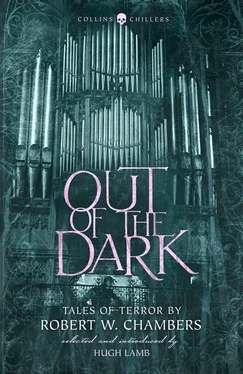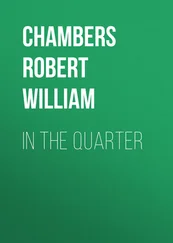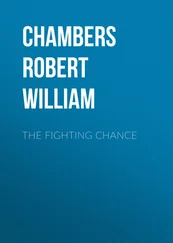Then I remembered that St Barnabé was not much more than a hundred years old, and smiled at the incongruous association of mediaeval superstitions with that cheerful little piece of eighteenth century rococo.
But now vespers were over, and there should have followed a few quiet chords, fit to accompany meditation, while we waited for the sermon. Instead of that, the discord at the lower end of the church broke out with the departure of the clergy, as if now nothing could control it.
I belong to those children of an older and simpler generation, who do not love to seek for psychological subtleties in art; and I have ever refused to find in music anything more than melody and harmony, but I felt that in the labyrinth of sounds now issuing from that instrument there was something being hunted. Up and down the pedals chased him, while the manuals blared approval. Poor devil! whoever he was there seemed small hope of escape!
My nervous annoyance changed to anger. Who was doing this? How dare he play like that in the midst of divine service? I glanced at the people near me: not one appeared to be in the least disturbed. The placid brows of the kneeling nuns, still turned toward the altar, lost none of their devout abstraction, under the pale shadow of their white head-dress. The fashionable lady beside me was looking expectantly at Monseigneur C—. For all her face betrayed, the organ might have been singing an Ave Maria.
But now, at last, the preacher had made the sign of the cross, and commanded silence. I turned to him gladly. Thus far I had not found the rest I had counted on, when I entered St Barnabé that afternoon.
I was worn out by three nights of physical suffering and mental trouble: the last had been the worst, and it was an exhausted body, and a mind benumbed and yet acutely sensitive, which I had brought to my favorite church for healing. For I had been reading ‘The King in Yellow’.
‘The sun ariseth; they gather themselves together and lay them down in their dens.’ Monseigneur C – delivered his text in a calm voice, glancing quietly over the congregation. My eyes turned, I knew not why, toward the lower end of the church. The organist was coming from behind his pipes, and passing along the gallery on his way out, I saw him disappear by a small door that leads to some stone stairs which descend directly to the street. He was a slender man, and his face was as white as his coat was black. ‘Good riddance!’ I thought, ‘with your wicked music! I hope your assistant will play the closing voluntary.’
With a feeling of relief, with a deep calm feeling of relief, I turned back to the mild face in the pulpit, and settled myself to listen. Here at last was the ease of mind I longed for.
‘My children,’ said the preacher, ‘one truth the human soul finds hardest of all to learn; that it has nothing to fear. It can never be made to see that nothing can really harm it.’
‘Curious doctrine!’ I thought, ‘for a Catholic priest. Let us see how he will reconcile that with the Fathers.’
‘Nothing can really harm the soul,’ he went on, in his coolest, clearest tones, ‘because—’
But I never heard the rest; my eye left his face, I knew not for what reason, and sought the lower end of the church. The same man was coming out from behind the organ, and was passing along the gallery the same way. But there had not been time for him to return, and if he had returned, I must have seen him. I felt a faint chill, and my heart sank; and yet, his going and coming were no affair of mine. I looked at him: I could not look away from his black figure and his white face. When he was exactly opposite to me, he turned and sent across the church, straight into my eyes, a look of hate, intense and deadly: I have never seen any other like it; would to God I might never see it again! Then he disappeared by the same door through which I had watched him depart less than sixty seconds before.
I sat and tried to collect my thoughts. My first sensation was like that of a very young child badly hurt, when it catches its breath before crying out.
To suddenly find myself the object of such hatred was exquisitely painful: and this man was an utter stranger. Why should he hate me so? Me, whom he had never seen before? For the moment all other sensation was merged in this one pang; even fear was subordinate to grief, and for that moment I never doubted; but in the next I began to reason, and a sense of the incongruous came to my aid.
As I have said, St Barnabé is a modern church. It is small and well lighted; one sees all over it almost at a glance. The organ gallery gets a strong white light from a row of long windows in the clerestory, which have not even colored glass.
The pulpit being in the middle of the church, it followed that, when I was turned toward it, whatever moved at the west end could not fail to attract my eye. When the organist passed it was no wonder that I saw him; I had simply miscalculated the interval between his first and his second passing. He had come in that last time by the other side-door. As for the look which had so upset me, there had been no such thing, and I was a nervous fool.
I looked about. This was a likely place to harbor supernatural horrors! That clear-cut, reasonable face of Monseigneur C—, his collected manner, and easy, graceful gestures, were they not just a little discouraging to the notion of a gruesome mystery? I glanced above his head, and almost laughed. That flyaway lady, supporting one corner of the pulpit canopy, which looked like a fringed damask table-cloth in a high wind, at the first attempt of a basilisk to pose up there in the organ loft, she would point her gold trumpet at him, and puff him out of existence! I laughed to myself over this conceit, which, at the time, I thought very amusing, and sat and chaffed myself and everything else, from the old harpy outside the railing, who had made me pay ten centimes for my chair, before she would let me in (she was more like a basilisk, I told myself, than was my organist with the anaemic complexion): from that grim old dame, to, yes, alas! to Monseigneur C— himself. For all devoutness had fled. I had never yet done such a thing in my life, but now I felt a desire to mock.
As for the sermon, I could not hear a word of it, for the jingle in my ears of
‘The skirts of St Paul has reached.
Having preached us those six Lent lectures,
More unctuous than ever he preached:’
keeping time to the most fantastic and irreverent thoughts.
It was no use to sit there any longer: I must get out of doors and shake myself free from this hateful mood. I knew the rudeness I was committing but still I rose and left the church.
A spring sun was shining on the rue St Honoré, as I ran down the church steps. On one corner stood a barrow full of yellow jonquils, pale violets from the Riviera, dark Russian violets, and white Roman hyacinths in a golden cloud of mimosa. The street was full of Sunday pleasure-seekers. I swung my cane and laughed with the rest. Some one overtook and passed me. He never turned, but there was the same deadly malignity in his white profile that there had been in his eyes. I watched him as long as I could see him. His lithe back expressed the same menace; every step that carried him away from me seemed to bear him on some errand connected with my destruction.
I was creeping along, my feet almost refusing to move. There began to dawn in me a sense of responsibility for something long forgotten. It began to seem as if I deserved that which he threatened: it reached a long way back – a long, long way back. It had lain dormant all these years: it was there though, and presently it would rise and confront me. But I would try to escape; and I stumbled as best I could into the rue de Rivoli, across the Place de la Concorde and on to the Quai. I looked with sick eyes upon the sun, shining through the white foam of the fountain, pouring over the backs of the dusky bronze river-gods, on the far-away Arc, a structure of amethyst mist, on the countless vistas of gray stems and bare branches faintly green. Then I saw him again coming down one of the chestnut alleys of the Cours la Reine.
Читать дальше












